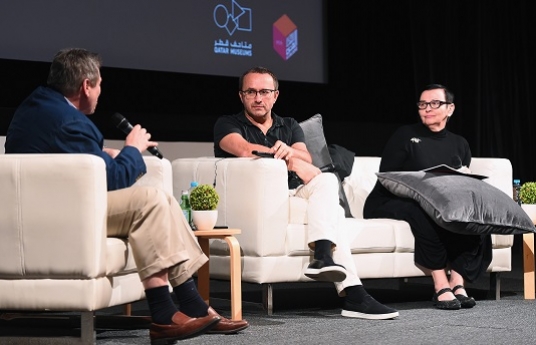Discover your inner voice and be yourself, Qumra Master Andrey Zvyagintsev tells emerging filmmakers
Mar 13, 2018

Doha, Qatar; March 13, 2018: Russian director and writer, Qumra Master Andrey Zvyagintsev (Leviathan, Loveless), took young filmmakers on an inspiring journey in a two-hour masterclass that chronicled his entry into films and his transformation as one of the world’s modern masters with an inimitable style and approach to cinema.
At Qumra, the industry event by the Institute that seeks out new voices in cinema and nurtures them with mentoring sessions, Zvyagintsev shared a crystal-clear vision that every emerging filmmaker should have: “Be yourself,” he said. “Discover your inner voice and build on it.”
Zvyagintsev referred to his own experiences, having ventured into cinema with no formal training. “My way of studying cinema was by watching films. I would immerse myself in world cinema – it was just the movies and I, and no mentors in between,” he said.
He recalled the days when he first ventured into filmmaking – coming at it as a transformational period, following the dissolution of the Soviet Union. “There were no boundaries or structures; it was very disorienting as well as encouraging. As a newcomer you could do anything,” said Zvyagintsev, whose background in the arts was in theatre and acting.
He took the opportunity to direct segments for television before he met Dmitry Lesnevsky, who decided to produce what would be Zvyagintsev’s film debut – The Return (which was screened at Qumra as part of the Modern Masters programme). The film about two Russian boys and their friction with their father who returns after 12 years won the Golden Lion at the Venice Film Festival, and has been described as one of the greatest films of the 21st century.
While watching a show-reel of the film at the Qumra masterclass, Zvyagintsev said he cannot watch it, as “I think how I could have made it differently” but went on to take the audience through the journey of its making. He said elaborate preparation went into its making for over a year, right from the selection of the actors to location-scouting and the many rehearsals that went in before filming it.
Zvyagintsev said: “I would say that the actors cast me and not the other way around.” His background in acting also helped him in finding actors “and vice versa”, he adds. The Return, he told the filmmakers in the audience, is also about letting the actors discover their inner voice. “I am a true believer in the adage that silence is louder than words. I encourage my actors to find that connection.”
He said that even in his subsequent works, including Elena (which won the Special Jury Prize at Cannes), Leviathan (which was nominated for the Academy Award for Best Foreign Film) and Loveless (winner of the Jury Prize at Cannes), he has gone by his personal belief in “giving full freedom to the actors and not binding them by a script.”
Zvyagintsev took audiences through crucial scenes from all the three films, explaining how he prepared for a crucial single-shot scene in Elena, and how he conceptualises his shots by working closely with his long-time accomplice, cinematographer Mikhail Krichman, as well as with the art director and music team. On working with Krichman, he said the two of them had at many points decided to part ways, but then “we sit together and discuss. It is like marriage – with its share of happiness and arguments.”
The bottomline, for Zvyagintsev, is preparation. “I believe that a film is best conceived at the preparatory stage, when everything is well-planned so you just have to go out and shoot.” This gives him the freedom to create his own mise en scène- be it erecting sets (as he did for Elena) or stumbling upon locations for The Return, Leviathan and Loveless.
In the making of Leviathan, inspired by the rampaging act of a muffler shop owner on an armored bulldozer in Colorado, there is another message that Zvyagintsev wants to offer emerging filmmakers. “It would have been too banal to make another film on the conflict between a solitary man and the establishment,” said Zvyagintsev. He, therefore, built many layers to the story, each character adding to the depth.
Zvyagintsev said he does not keep in mind international audiences or how they relate to his characters or their action when he makes his films. Citing Loveless, he said, “in Russia, many denied any relationship with the characters; they said the characters were monsters and had nothing to do with them.”
He creates films that be believes in, mostly shaped form his close observation of people, of his passion for arts and literature – “literature helps you build the narrative; art gives you great composition” – and in the realisation that there are going to be challenges along the way. “There is no set recipe for success. There are going to be difficulties. But when you discover your inner voice, you get past them.”
The fourth edition of Qumra brings together more than 150 acclaimed filmmakers, industry professionals and experts to nurture 34 films – the Qumra Projects – by first and second-time filmmakers that are in various stages of development. The six-day event is held through March 14, at Souq Waqif and the Museum of Islamic Art, and features Qumra Masterclasses, Qumra Talks and screenings in the Modern Masters and New Voices in Cinema segments.